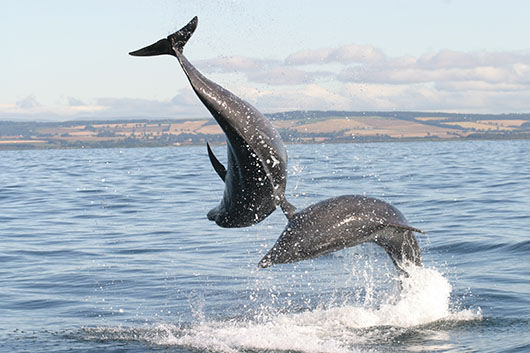The old grey whistle test

Two long-term resident mothers of the Sarasota Bay bottlenose dolphin community flank their new calves. Photo by Katherine McHugh, Sarasota Dolphin Research Program, taken under National Marine Fisheries Service Scientific Research Permit No. 15543.
Dolphins mimic those closest to them as a way of getting in touch, according to the latest research.
The new study, by marine biologists at the University of St Andrews, showed that dolphins only copy those that they share strong social bonds with.
The team of Scottish and American scientists studied dolphin ‘signature’ (unique) whistles to find out why they appear to copy one another.
In fact, they only found copying present in mothers and their offspring and adult males, who copied those they had long-term associations with.
Listen to adult males’ unique signature whistles followed by one mimicking the other:
Bottlenose dolphins are one of the very few species in the animal kingdom that use vocal learning to develop their own vocal signature early in life. Each dolphin produces its own unique signature whistle that describes its individual identity.
The copying of signature whistles has been noted in previous studies, but scientists have been unsure whether it is an aggressive or friendly signal.
The new study suggests that in fact dolphins are mimicking those they are close to and want to see again.
The research was carried out by Drs Stephanie King and Vincent Janik from St Andrews alongside Dr Laela Sayigh from the Woods Hole Oceanographic Institution, Dr Randall Wells from the Chicago Zoological Society and Dr Fellner from the Walt Disney World Resort.
The scientists analysed acoustic recordings from wild and captive dolphins to identify which animals copy one another’s individually distinctive signature whistle.
Dr King explained, “Interestingly, signature whistle copying was only found in pairs of animals composed of mothers and their calves or adult males who form long-term alliances with one another.”
The team also found that dolphins introduce slight changes into copies, thus avoiding confusion for listeners. The copies were clearly directed towards the owner of the original signature whistle by being produced immediately after the owner of the whistle called first, a behaviour known as vocal matching.
Dr King added, “The fact that animals are producing whistle copies when they are separated from a close associate supports the idea that dolphins copy another animal’s signature whistle when they want to reunite with that specific individual.
“Our next step is to use sound playbacks to see how dolphins respond to being matched with a copy of their own signature whistle. If they react we would know that copying of signature whistles can be used to address dolphins.”
The results are published this week in the journal Proceedings of the Royal Society B.
ENDS
NOTE TO EDITORS:
Dr Stephanie King is available for interview on [email protected] or Tel 01334-479100
Issued by the Press Office
Contact Gayle Cook, Senior Communications Manager on 01334 467227, [email protected]
Ref: Old Grey Whistle Test 190213
Follow St Andrews news on Twitter
Like on Facebook
Category Research